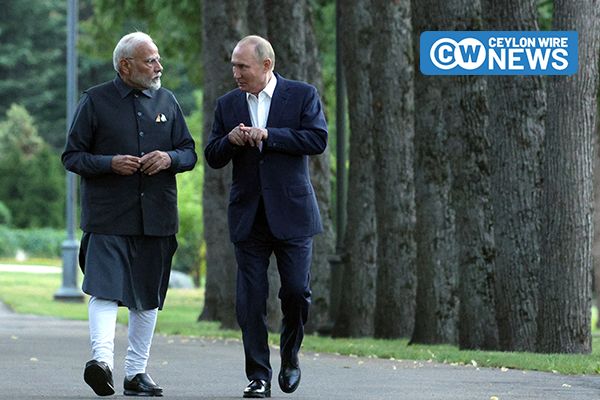Indian Prime Minister Narendra Modi and Russian President Vladimir Putin have begun structured talks in Moscow, with the Rupee-Ruble trade deal at the forefront of their agenda.
This agreement is expected to benefit not only India and Russia but also their neighboring countries, including Sri Lanka.
Prime Minister Modi’s two-day visit to Russia, his first since the onset of the Ukraine conflict, marks a crucial point in Indo-Russian relations.
The discussions, taking place at Putin’s residence and later at the Kremlin, are set to cover a range of global issues, with a strong emphasis on economic cooperation and defense deals.
Abhay Singh, a prominent Indian-origin lawmaker in Russia, has highlighted the significance of the Rupee-Ruble trade deal.
“This deal will strengthen the currencies of both nations. Neighboring countries of India, like Sri Lanka, Bangladesh, and Nepal, will use the Indian rupee, while Russia’s neighbors, including Belarus and Kazakhstan, will adopt the Russian ruble,” Singh explained.
Singh elaborated on the potential benefits, stating, “The Rupee-Ruble deal is a very good agreement. It will enhance trade not only between India and Russia but also with other neighboring countries. For instance, they could purchase petrol using Indian rupees, which would then be paid to Russia in rubles. This shift could diminish the dominance of the US dollar and fortify the rupee and ruble.”
This potential shift in trade dynamics comes on the heels of other significant economic developments.
Last week, Iran and Russia signed their first bilateral monetary agreement, designed to bolster their financial and economic ties amidst US sanctions.
Iran’s integration into the MIR payment system, Russia’s alternative to Visa and Mastercard, will enable Iranians to withdraw money from Russian ATMs using Iranian bank cards from late August.
Furthermore, in February 2024, Prime Minister Modi, along with Sri Lankan President Ranil Wickremesinghe and Mauritian Prime Minister Pravind Jugnauth, inaugurated the launch of Unified Payment Interface (UPI) services in Sri Lanka and Mauritius.
UPI is an instant real-time payment system that facilitates inter-bank transactions via mobile phones, reflecting India’s growing influence in regional financial infrastructure.
As Modi and Putin navigate the future of the Rupee-Ruble trade deal, the ripple effects on regional economies, particularly Sri Lanka, could be substantial.
Strengthening the rupee and ruble through such agreements promises to reshape trade practices, potentially reducing reliance on the US dollar and fostering greater economic stability in the region.








